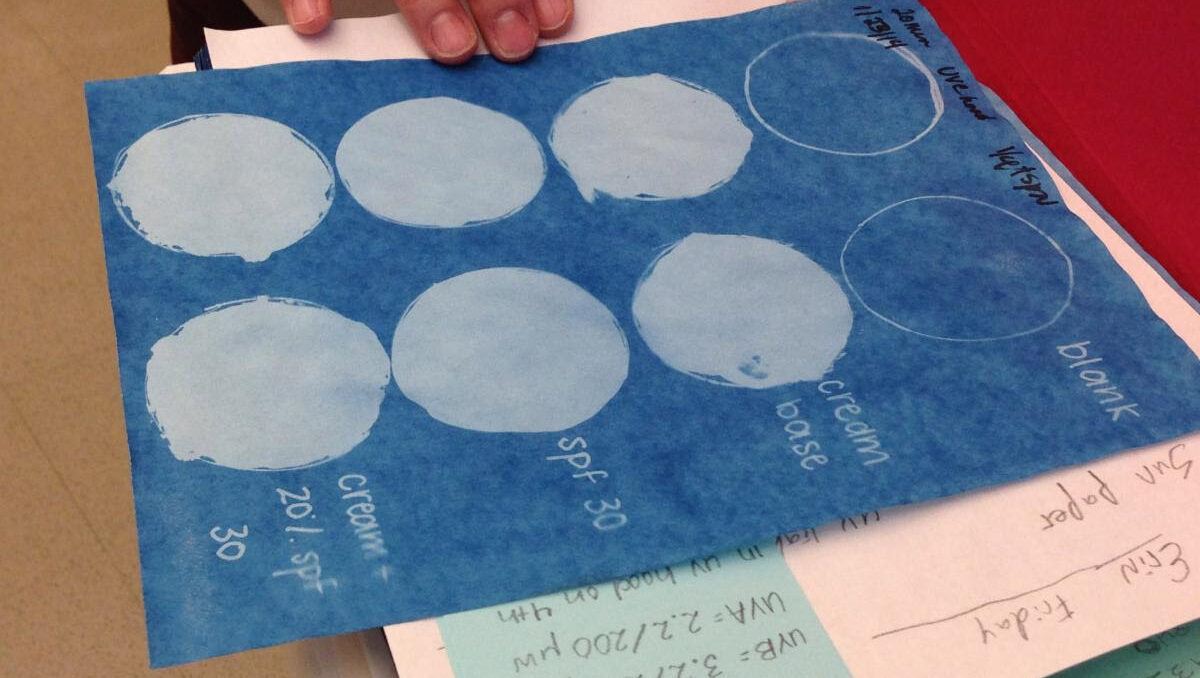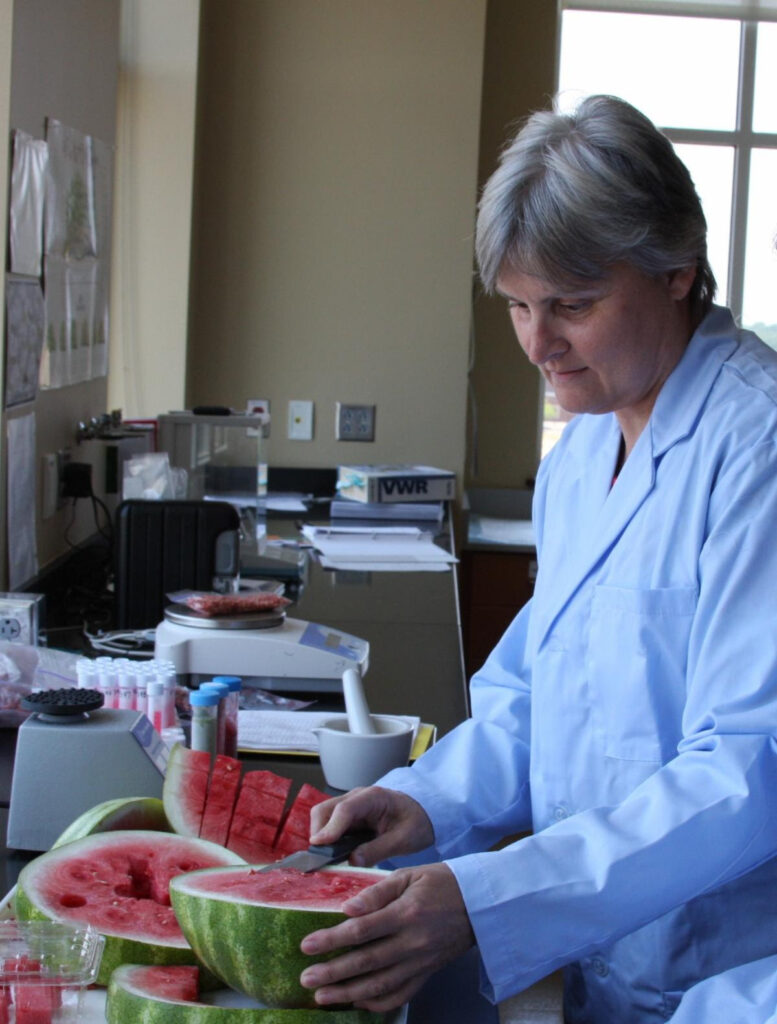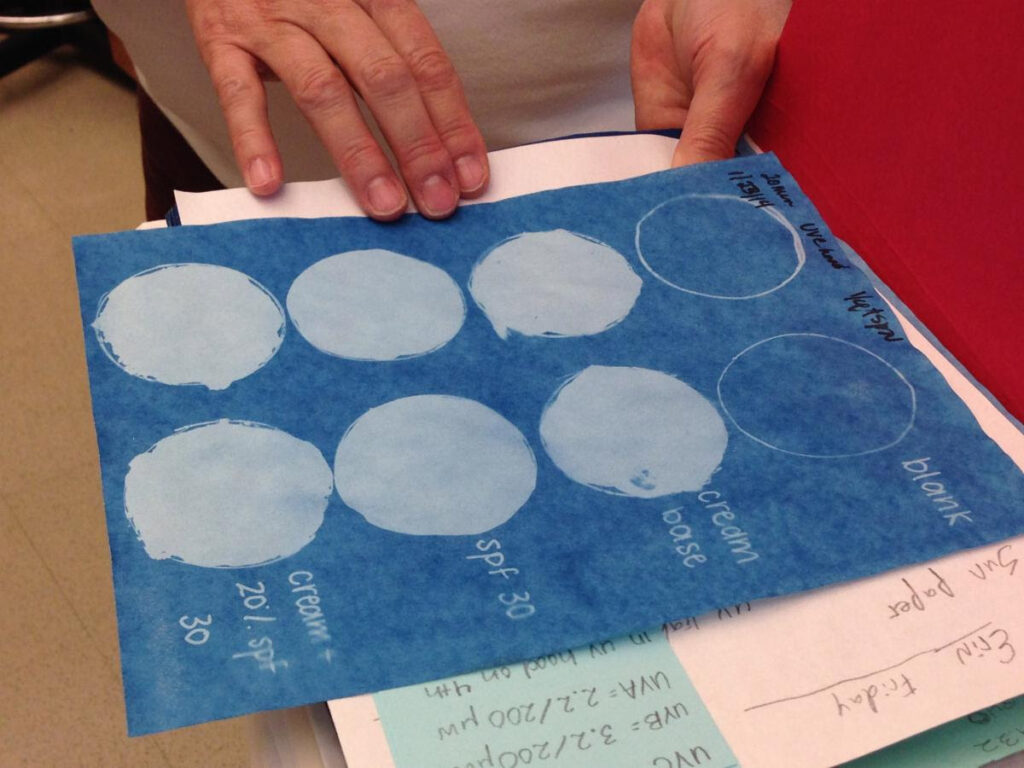Watermelon – More than a refreshing treat

Watermelons are a favorite research crop for Dr. Penelope Perkins-Veazie. She has helped improve commercial watermelon production, but has also done extensive research looking at the health benefits watermelon offers.

She’s even done a few out-of-the-box projects, including overseeing a student-driven recipe development for watermelon-mango-guava fruit leather and evaluating a watermelon-based cream as a sunblock for UVA and UVB light. Most commonly consumed as a fresh fruit, the bottom line is that with magnesium, vitamin C, and plenty of fluid, watermelons are a great hydration choice on a hot summer day, but they do have a lot more to offer.
Watermelon contains the carotenoids betacarotene and lycopene. Eating these carotenoids, also found in tomatoes, red bell peppers, mangos, and grapefruit, in the summer is a great way to support skin health and protection from the sun’s damaging UV rays.1 Beta carotene and lycopene, when ingested in food or supplement form, follow a couple of specific pathways to counter oxidative stress induced by UVB rays.1 Carotenoids naturally work in plants as antioxidants that protect against the oxidation effects of UV light. Fortunately, they can work the same way in human tissue.2 Keep in mind that red watermelons will have more lycopene than yellow-fleshed watermelons.

L-citrulline is a non-essential amino acid found in watermelons (non-essential means that it can be made in the body, but it’s not essential for us to consume it). The liver and intestine make L-citrulline for various functions. L-citrulline is transformed into L-arginine as part of the urea cycle. L-arginine is another non-essential amino acid that helps make new protein in the body. L-citrulline and L-arginine are popular supplements with weight lifting athletes and are often used in pre-workout regimens, but can also help prevent age-related muscular degeneration, called sarcopenia.4 Because these two amino acids increase nitric oxide, a vasodilator, the thought is that oxygen perfusion to muscle tissue will increase, perhaps leading to a more productive workout or maintained muscle mass with aging.3,4
Several studies are showing that L-citrulline may have the ability to lower blood pressure.5 The body uses L-citrulline and L-arginine, through a variety of processes including the urea cycle, to make nitric oxide. The medication nitroglycerin is metabolized by the body to produce nitric oxide. It has been used as a medication for nearly 150 years for angina because of its blood vessel dilation capabilities. Incorporating more foods high in L-citrulline into the diet may help to support the natural nitric oxide synthesis and the body’s ability to regulate blood pressure. Research is even beginning to look at L-citrulline for erectile dysfunction. For the same reason that L-citrulline lowers blood pressure through increased nitric oxide production and vasodilation, there is evidence that the same process that increases blood flow can improve erectile dysfunction especially when already taking a phosphodiesterase type 5 inhibitor like sildenafil and tadalafil.6
Citations
- Calniquer, G., Khanin, M., Ovadia, H., Linnewiel-Hermoni, K., Stepensky, D., Trachtenberg, A., Sedlov, T., Braverman, O., Levy, J., & Sharoni, Y. (2021). Combined Effects of Carotenoids and Polyphenols in Balancing the Response of Skin Cells to UV Irradiation. Molecules, 26(7), 1931.
- Maoka, T. (2020). Carotenoids as natural functional pigments. Journal of natural medicines, 74(1), 1-16.
- Sadji, M., Perkins-Veazie, P. M., Ndiaye, N. F., Traore, D., Guoying, M. A., Zongo, C., … & Traore, A. (2015). Enhanced L-citrulline in parboiled paddy rice with watermelon (Citrullus lanatus) juice for preventing sarcopenia: A preliminary study. African Journal of Food Science, 9(10), 508-513.
- Gonzalez, A. M., & Trexler, E. T. (2020). Effects of citrulline supplementation on exercise performance in humans: A review of the current literature. The Journal of Strength & Conditioning Research, 34(5), 1480-1495.
- Figueroa, A., Wong, A., & Kalfon, R. (2014). Effects of Watermelon Supplementation on Aortic Hemodynamic Responses to the Cold Pressor Test in Obese Hypertensive Adults. American Journal of Hypertension, 27(7), 899–906.
- Shirai, M., Hiramatsu, I., Aoki, Y., Shimoyama, H., Mizuno, T., Nozaki, T., Fukuhara, S., Iwasa, A., Kageyama, S., & Tsujimura, A. (2018). Oral L-citrulline and Transresveratrol Supplementation Improves Erectile Function in Men With Phosphodiesterase 5 Inhibitors: A Randomized, Double-Blind, Placebo-Controlled Crossover Pilot Study. Sexual medicine, 6(4), 291–296.
- Categories: